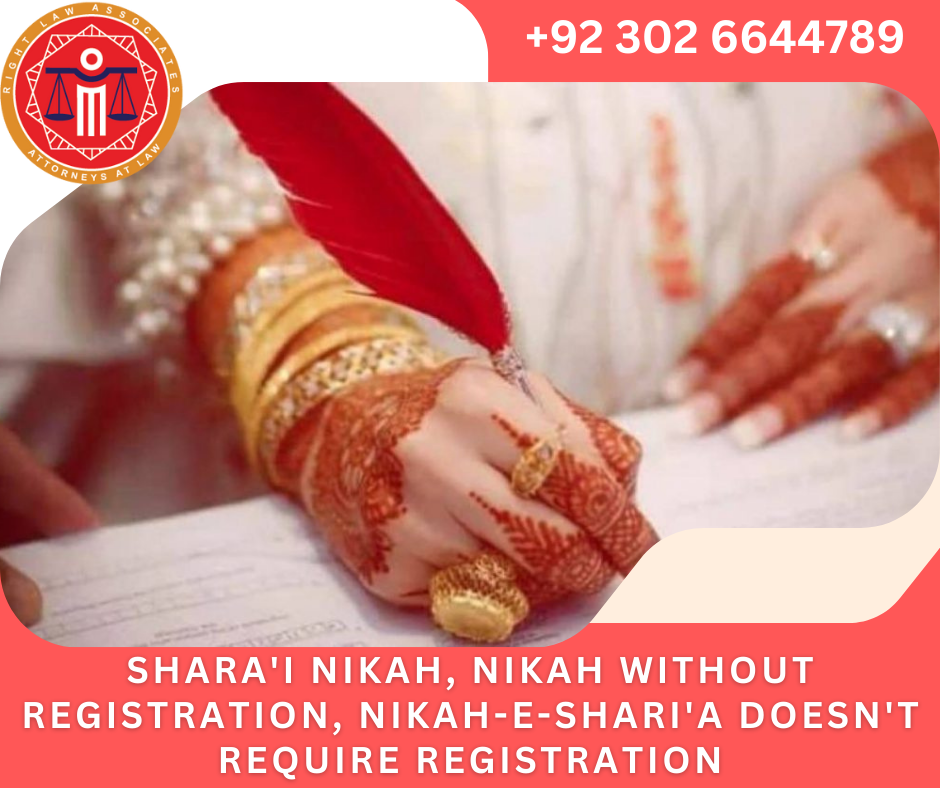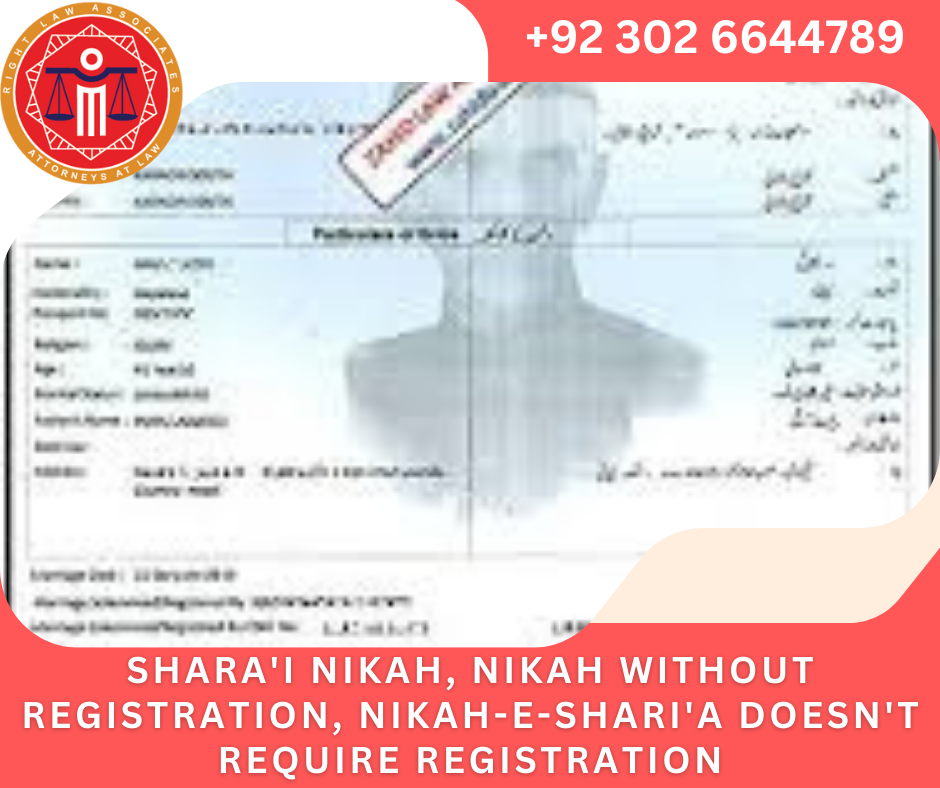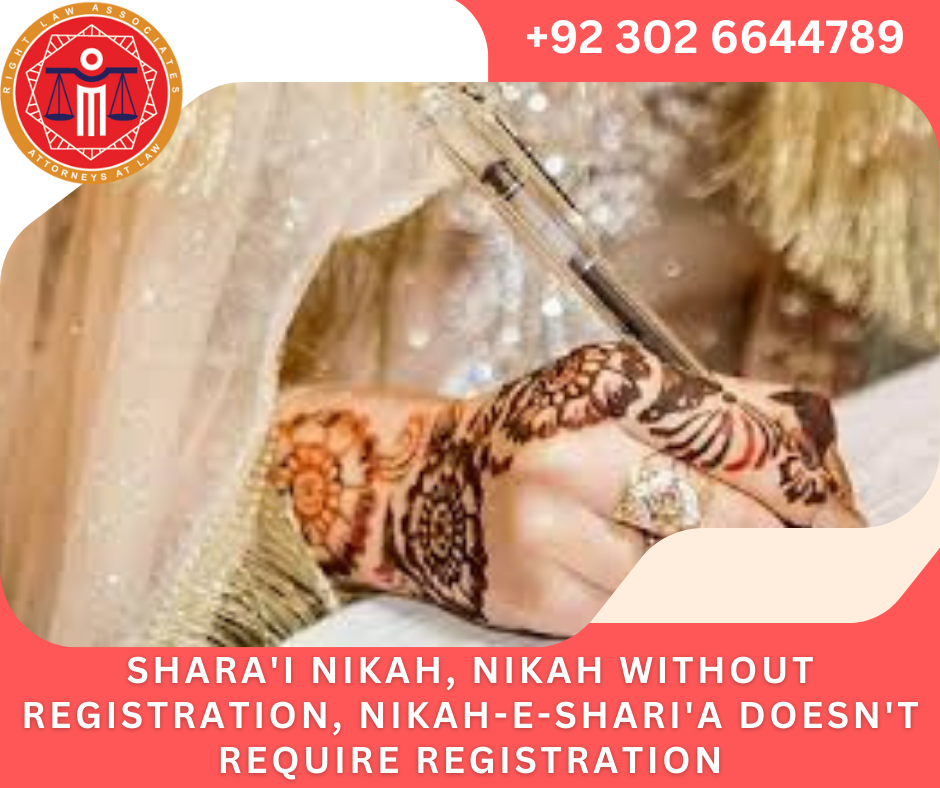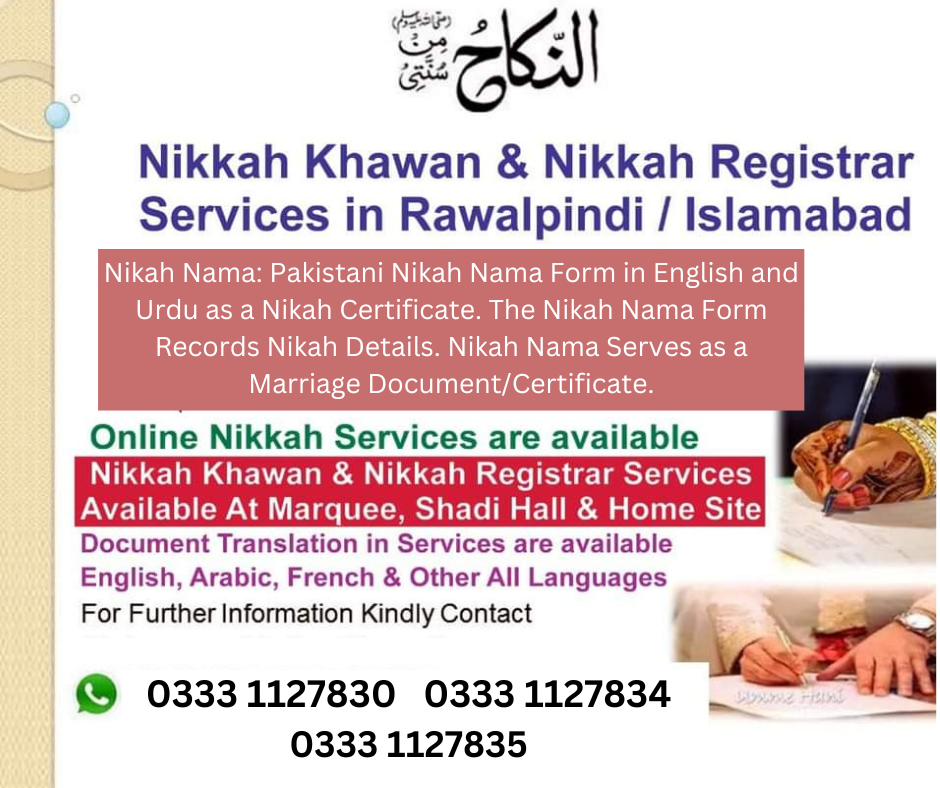Shara'i Nikah, Nikah without Registration, Nikah-e-Shari'a Doesn't Require Registration

Shara'i Nikah vs. Court Marriage in Pakistan: Understanding the Differences
Shara’i Nikah, performed according to Islamic law, requires only the exchange of vows (Ijab-o-qabool) with witnesses present and a Mahr (dowry) agreed upon. While religiously valid, it lacks legal recognition in Pakistan. On the other hand, court marriage is a civil ceremony documented as per law, granting legal rights and protections to spouses. Understanding these distinctions helps couples choose the path best suits their religious and legal needs.
Validity of Nikah-e-Shari’a: Does it Require Registration in Karachi and other cities/provinces of Pakistan?
A Nikah-e-Shari’a, performed according to Islamic principles, is religiously valid in Karachi and all other cities/provinces of Pakistan and throughout the Muslim world. However, it doesn’t hold legal weight in Pakistani courts. This can not lead to inheritance, property rights, and spousal support complications in disputes. While registration isn’t mandatory for the religious ceremony itself, opting for a court marriage alongside the Nikah-e-Shari’a provides legal security and safeguards the rights of both partners.
Marrying the Islamic Way: Exploring Shara’i Nikah in Islamabad
For Muslim couples in Islamabad seeking a traditional Islamic wedding, Shara’i Nikah offers a spiritual and meaningful ceremony. The focus lies on fulfilling religious requirements like exchanging vows in the presence of witnesses and agreeing upon a Mahr. However, couples should know that Shara’i Nikah alone doesn’t grant legal recognition. A court marriage can be performed alongside a religious ceremony to ensure legal protection.

Shara'i Nikah in Lahore: A Guide for Muslim Couples
Shara’i Nikah in Lahore is a sacred ceremony that binds a couple according to Islamic law. The core elements involve the ijab-qabul (exchange of vows) witnessed by two Muslim men and the offering of Mahr. While religiously significant, a Shara’i Nikah doesn’t hold legal standing in Pakistan’s court system. Couples seeking legal security, particularly regarding finances and inheritance, may consider a court marriage alongside the Shara’i Nikah.
Can You Have a Nikah Without Registration in Pakistan? Clarifying the Legalities
In Pakistan, you can have a Nikah ceremony without registration. The Shara’i Nikah, performed according to Islamic principles, is valid religiously. However, the absence of registration renders it unrecognized in the legal system. This can pose challenges in property disputes, inheritance claims, or seeking spousal support. To ensure legal protection and safeguard your rights, it’s advisable to consider a court marriage alongside the Shara’i Nikah.
Shara’i Nikah vs. Civil Marriage: Which Option is Right for You in Rawalpindi?
Choosing between Shara’i Nikah and civil marriage in Rawalpindi depends on your priorities. Shara’i Nikah fulfills religious requirements and carries deep spiritual significance. However, it needs legal recognition. Conversely, a civil marriage is a legal ceremony documented by the court, granting couples legal rights and protections. Couples seeking a purely religious ceremony can opt for Shara’i Nikah. However, a civil marriage is recommended for legal security, primarily if you reside in Rawalpindi.

Benefits and Considerations of Shara'i Nikah in Karachi
Shara’i Nikah in Karachi offers a religious and traditional way for Muslim couples to begin their married life. The ceremony itself is relatively simple and focuses on fulfilling Islamic requirements. However, couples should be aware of the limitations. A Shara’i Nikah doesn’t hold legal weight in Pakistani courts. To ensure legal safeguards regarding finances, inheritance, and other matters, it’s advisable to consider a court marriage alongside the Shara’i Nikah.
Seeking Guidance: Is Shara’i Nikah Enough in Pakistan’s Legal System?
Shara’i Nikah, while religiously valid, isn’t sufficient in Pakistan’s legal system. Refrain from registration to avoid complexities in disputes concerning property, inheritance, or spousal support. A court marriage documented by the court is recommended to ensure legal protection. If you need clarification on the legalities or require further guidance, consulting a lawyer specializing in family law is wise.
Finding a Sharia Scholar for Your Nikah Ceremony in Islamabad
Finding a qualified Sharia scholar is crucial for a Shara’i Nikah ceremony in Islamabad. The scholar will guide the couple through the religious requirements, ensuring the ceremony adheres to Islamic principles. Mosques often have resident Imams who can perform Nikah ceremonies. Alternatively, you can seek recommendations from friends, family, or local Islamic centers to find a reputable Sharia scholar in Islamabad.
Shara’i Nikah vs. Court Marriage: A Comparison for Couples in Rawalpindi
For couples in Rawalpindi, both Shara’i Nikah and court marriage offer paths to married life. Shara’i Nikah prioritizes religious fulfillment, focusing on exchanging vows and agreeing upon Mahr. The ceremony concludes with a Nikah Nama (marriage contract) – a document traditionally written in Urdu or English outlining the agreed-upon Mahr and other Islamic stipulations. Conversely, a court marriage is a legal ceremony documented by the government, granting legal rights and protections. While a Nikah Nama can be included in a court marriage, it serves a different purpose, focusing on legalities rather than religious obligations.
The Religious Significance of Shara'i Nikah in Pakistan
Shara’i Nikah holds deep religious significance for Muslims in Pakistan. It signifies a sacred union established according to Islamic law. The ceremony fulfills specific religious requirements, including exchanging vows in the presence of witnesses and offering Mahr. A Nikah Nama, traditionally written in Urdu or English, further emphasizes the spiritual intent and records the agreed-upon Mahr. While not mandatory for the ceremony’s validity, it carries symbolic importance and can be helpful for future reference.
Can a Shara’i Nikah Alone Grant Spousal Rights in Karachi?
While religiously valid, a Shara’i Nikah performed in Karachi doesn’t automatically grant legal recognition of spousal rights. This can lead to complications regarding inheritance, property ownership, or seeking spousal support in disputes. A Nikah Nama, documenting the Mahr agreement, can be used as evidence in family courts. However, a court marriage alongside the Shara’i Nikah is highly recommended for comprehensive legal protection and enforcement of spousal rights.

Considerations for a Valid Shara'i Nikah Ceremony in Islamabad
A valid Shara’i Nikah ceremony in Islamabad requires fulfilling specific conditions. The bride’s consent (walima) must be freely given, and a Mahr (dowry) must be agreed upon and offered. The exchange of vows (ijab-qabul) with witnesses present is another crucial element. While a Nikah Nama (marriage contract) in Urdu or English isn’t mandatory, it’s a recommended practice to document the agreed-upon Mahr and other relevant details for future reference. Consulting a qualified Sharia scholar can ensure your Shara’i Nikah meets all Islamic requirements.
Navigating the Legalities of Nikah-e-Shari’a in Lahore
Navigating the legalities of Nikah-e-Shari’a in Lahore requires understanding its limitations. The religious ceremony, documented with a Nikah Nama (marriage contract) in Urdu or English, is valid religiously but lacks legal standing in Pakistani courts. This can pose challenges in situations like property disputes or inheritance claims. To ensure legal recognition and protection of spousal rights, opting for a court marriage alongside the Nikah-e-Shari’a is highly advisable. Consulting a lawyer can provide further guidance on navigating the legalities of Nikah-e-Shari’a in Lahore.
Marrying Under Islamic Law: A Look at Shara’i Nikah in Rawalpindi
Marrying under Islamic law in Rawalpindi involves performing a Shara’i Nikah. This religious ceremony focuses on fulfilling Islamic requirements like exchanging vows and offering a Mahr. The ceremony can be documented with a Nikah Nama (marriage contract) in Urdu or English, outlining the agreed-upon Mahr and other Islamic stipulations. While religiously significant, a Shara’i Nikah alone doesn’t grant legal recognition in Pakistan. Couples seeking legal security, particularly regarding finances and inheritance, may consider a court marriage alongside the Shara’i Nikah.

Shara'i Nikah Registration: Is it Mandatory in Pakistan?
Registration of a Shara’i Nikah is optional in Pakistan. The ceremony, documented with a Nikah Nama (marriage contract) in Urdu or English, is religiously valid. However, the absence of registration renders it unrecognized in the legal system. This can lead to complexities in disputes concerning property, inheritance, or spousal support. To ensure legal protection and safeguard your rights, it’s highly advisable to consider a court marriage documented by the court alongside the Shara’i Nikah.
Financial Implications of Shara’i Nikah vs. Court Marriage in Karachi
While Shara’i Nikah and court marriage offer paths to matrimony in Karachi, their financial implications differ. Shara’i Nikah has minimal costs, focusing on the Mahr (dowry) agreed upon by the couple. A Nikah Nama (marriage contract) in Urdu or English, outlining the Mahr details, can be a simple document. Conversely, court marriages involve court fees and potentially lawyer consultations, making them slightly more expensive. However, the legal recognition gained through a court marriage can provide financial security in the long run, especially regarding inheritance and property rights.
Ensuring a Smooth Shara’i Nikah Process in Islamabad with Expert Guidance
Planning a Shara’i Nikah in Islamabad can be streamlined with expert guidance. Consulting a qualified Sharia scholar ensures the ceremony adheres to Islamic requirements. For clarity, they can advise on the Mahr amount, witness selection, and the Nikah Nama (marriage contract) content, ideally written in Urdu or English. Additionally, a lawyer specializing in family law can provide valuable insights, particularly if the couple intends to combine the Shara’i Nikah with a court marriage for legal protection.

Witness Requirements for a Valid Shara'i Nikah Ceremony in Lahore
Witness requirements are crucial for a valid Shara’i Nikah ceremony in Lahore. Two Muslim men of sound mind and above puberty must be present while exchanging vows (ijab-qabul). These witnesses can be family members or friends as long as they understand the significance of the ceremony. While a Nikah Nama (marriage contract) in Urdu or English isn’t mandatory, having the witnesses sign it alongside the couple strengthens the record of the ceremony.
Resolving Disputes Arising from Unregistered Shara’i Nikah in Rawalpindi
Unregistered Shara’i Nikah in Rawalpindi can lead to complexities if disputes arise. While religiously valid, the ceremony lacks legal recognition in Pakistani courts. This can make resolving issues concerning inheritance, property ownership, or spousal support challenging. The absence of a documented Nikah Nama (marriage contract) in Urdu or English can further complicate matters. To avoid such difficulties, opting for a court marriage alongside the Shara’i Nikah is highly recommended.
Shara’i Nikah and its Recognition in Pakistani Courts
Shara’i Nikah, a religious ceremony documented with a Nikah Nama (marriage contract) in Urdu or English, is valid religiously in Pakistan. However, it doesn’t hold legal weight in the court system. This means that in disputes regarding finances, inheritance, or child custody, a Shara’i Nikah alone might not be sufficient evidence. To ensure legal recognition and protection of spousal rights, a court marriage documented by the court is highly advisable alongside the Shara’i Nikah.

Modern Challenges of Shara'i Nikah in a Changing Society - Karachi Perspective
In a rapidly evolving society like Karachi, Shara’i Nikah faces some modern challenges. While the religious significance remains strong, the lack of legal recognition in court can concern couples seeking financial security. Additionally, the traditional Mahr negotiation process, documented in the Nikah Nama (marriage contract), might sometimes align with the evolving financial aspirations of some couples. Open communication and a willingness to adapt traditions can help couples navigate these challenges and ensure a fulfilling Shara’i Nikah experience.
Importance of a Nikahnama in a Shara’i Nikah Ceremony (Islamabad Focus)
A Nikah Nama (marriage contract) plays a significant role in a Shara’i Nikah ceremony in Islamabad. Ideally written in Urdu or English for clarity, it documents the agreed-upon Mahr amount and other relevant details. While not mandatory for the ceremony’s validity, the Nikah Nama serves as a crucial record, especially if disputes arise in the future. Having the Nikah Nama witnessed and signed by the couple, and the witnesses further strengthen its validity.
Mahr Negotiation During Shara’i Nikah in Lahore
Mahr negotiation is a crucial aspect of the Shara’i Nikah ceremony in Lahore. The Mahr, a mandatory Islamic dowry, is documented in the Nikah Nama (marriage contract) written in Urdu or English. Traditionally, negotiation involves the bride’s family and the groom, intending to agree on a fair and symbolic Mahr. However, modern couples in Lahore might approach the negotiation differently, focusing on empowering the bride and potentially including non-monetary aspects alongside the traditional Mahr.
Online Marriage and Online Nikah have the same meaning in Pakistan & Islamic countries
online marriage, online nikah, online shadi, nikah online, marriage online
Legal Services
Our Attorneys

Let's Connect
- +92 333 2316871
- [email protected]
-
Karachi Head Office:
A-1937/B, Near Shop 399 Garment Store, Metroville III Colony, Scheme 33, Gulzar e Hijri, Maulana Yousuf Ludhianwi Road, Karachi, Pakistan -
Karachi Branch:
M-51, Muneer Mobile Mall, Block 17, Near Perfume Chowk & Jauhar Chowrangi, Gulistan-e-Jauhar, Karachi, Pakistan -
Islamabad Office:
Suite No. 5, 2nd Floor, Laraib Centre, Mangla Road, Karachi Company, G-9 Markaz, Islamabad, Pakistan -
Lahore Office:
Office No. 2, 1st Floor, Landmark Plaza, Jail Road, Lahore, Pakistan
-
Court Marriage with Full Privacy Assurance
-
Court Marriage for Couples Seeking Legal Union
-
Court Marriage in Pakistan: Court Marriage Process & Fees
-
Court Marriage: Confidential & Hassle-Free Solutions
-
Trend of Court Marriage in Pakistan: Court Marriage's Reasons
-
Court Marriage Services in Karachi, Lahore, Islamabad, and Rawalpindi
-
Understanding Court Marriage in Pakistan: A Guide to Court Marriage
-
Best Family: What Makes a Family Truly Great
-
Divorce Papers in Pakistan: Divorce Deed and NADRA Divorce Certificate
-
Court Marriage in Pakistan: Procedure and Fees
-
Court Marriage in Lahore: Our Court Marriage Service in Lahore
-
Nikah Khawan and Nikah Registrar Services in Karachi, Pakistan
-
Family Law in Pakistan-The Muslim Family Law Ordinance 1961
-
Understanding Online Nikah: The Crucial Roles of Nikah Khawan and Nikah Registrar
-
Nikah Khawan and Nikah Registrar Services in Pakistan
-
Lawyers Help for Court Marriage Procedure in Karachi
-
Online Marriage in Islam: Muslim Online Marriage
-
Court Marriage in Pakistan-FAQ About Court Marriage in Pakistan
-
Court Marriage, Online Marriage, and Nikah-Khawan Services in Islamabad & Rawalpindi
-
Online Marriage/Nikah | Online Marriage/Nikah Services In and From Pakistan
-
Nikah Khawan/Qazi Services and Fees in Karachi-Lahore-Islamabad/Rawalpindi-Faisalabad-Multan
-
Court Marriage Pakistan | Court Marriage Services-Process-Fees in Pakistan
-
Embracing Online Marriage Services Across Karachi, Lahore, Islamabad, and Rawalpindi, Pakistan
-
Family Law | Expert Divorce Lawyers For Khula/Talaq (Divorce) in Karachi, Islamabad/Rawalpindi & Lahore, Pakistan
-
Guardianship Lawyers in Karachi, Lahore, & Islamabad Pakistan
-
Child Custody Lawyers in Karachi, Lahore, & Islamabad-Pakistan
-
English Nikah Nama | English Nikah Nama Available in Karachi
-
Family Law | Expert Divorce Lawyers For Khula/Talaq (Divorce) in Karachi, Islamabad/Rawalpindi & Lahore, Pakistan
-
Nikah Nama Urdu/English Available in Karachi
-
Nadra Marriage Registration Service | Marriage Registration Certificate
-
Marriage Registration | Nadra Marriage Certificate-Karachi
-
Nikah Nama Services with Nikah Nama English & Urdu
-
Nikah Registration | Nikah Registration Services-Pakistan
-
What is Child Guardianship
-
Top Rated Advocates for Family Law Matters
-
B Form NADRA: Importance of B Form in Pakistan
-
Nadra B Form in Pakistan
-
Is Court Marriage Legal in Pakistan
-
Child Maintenance Advocates in Karachi
-
Consumer Rights Advocates in Karachi
-
Best Leady Lawyer Expertise as a Family Court Lawyer
-
Online Nikah Marriage In Pakistan
-
Business Corporate lawyers in Pakistan
-
Criminal Lawyers in Karachi | Lahore | Islamabad Rawalpindi | Pakistan
-
Understanding Business Law Corporate Lawyers Services in Pakistan
-
Online Marriage Technology in Modern
-
Court Marriage Professional Lawyers in Lahore
-
Court Marriage in Pakistan and Civil Marriage: Right Law Firm
-
Property Lawyers in Pakistan
-
Property Lawyers Expert in Pakistan
-
Minimum Wage in Pakistan
-
Property Disputes a Comprehensive Guide
-
Child Adoption Procedure & Services in Pakistan
-
Legally Valid Online Nikah, Your Love Story with Online Marriage
-
Online Nikah Excellence Pioneering Legally Sound Online Marriage
-
Court Marriage the Effortless Formality
-
Court Marriage in Pakistan-No.1 Court Marriage Service in Karachi
-
Navigating the Path to Legal Unions, Court Marriage in Pakistan
-
Court Marriage, Empowering Personal Choice and Freedom
-
Trusted Court Marriage Law Firm
-
Court Marriage a Journey Court Marriage in Pakistan
-
Power of Nikah Certificates
-
Nikah Certificates-Legality in Pakistan
-
Adoptions and Adoptive Families in Pakistan
-
Court Marriage in Pakistan A Comprehensive Guide
-
<strong>Tax Lawyer Mohsin Ali Shah</strong>
-
Civil Lawyers The Importance of Evidence in Civil Cases-Expert Tips for Civil Lawyers
-
Can There Be Objections to a Public Party Following a Court Marriage.
-
Court Marriage Making Love Officially Recognized Via Court Marriage
-
Court Marriage, Civil Marriage & Online Nikah in Pakistan
-
Misyar Marriage Nikah Misyar Facts About Misyar Marriages
-
Online Nikah and Online Marriage in Pakistan
-
The government of Pakistan amended the Civil and Criminal Law to bring reforms in Justice System
-
Child Adoption & Guardianship in Pakistan
-
Restitution of Conjugal Rights
-
Difference between Divorce Talaq and Khula:
